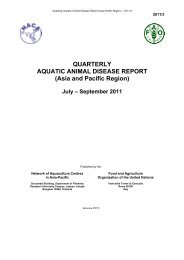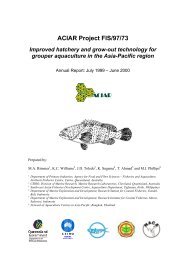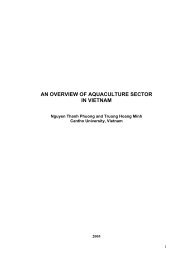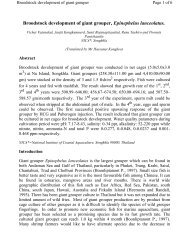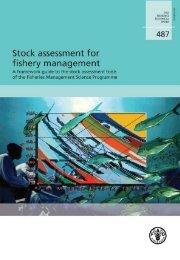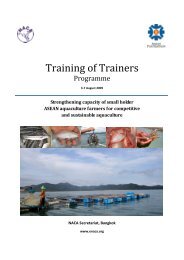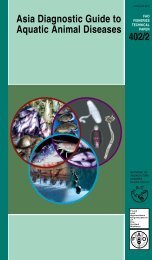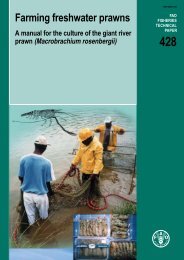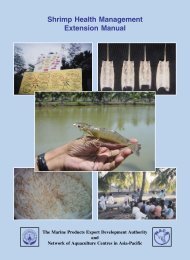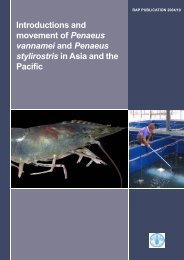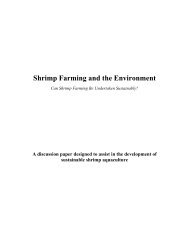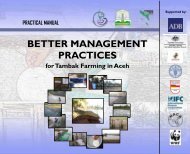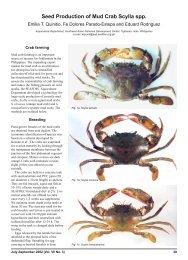State of World Fisheries and Aquaculture 2004 - Library
State of World Fisheries and Aquaculture 2004 - Library
State of World Fisheries and Aquaculture 2004 - Library
Create successful ePaper yourself
Turn your PDF publications into a flip-book with our unique Google optimized e-Paper software.
58<br />
The <strong>State</strong> <strong>of</strong> <strong>World</strong> <strong>Fisheries</strong> <strong>and</strong> <strong>Aquaculture</strong> <strong>2004</strong><br />
<br />
<br />
<br />
<br />
<br />
<br />
<br />
<br />
<br />
<br />
<br />
<br />
<br />
<br />
<br />
<br />
<br />
<br />
<br />
<br />
<br />
<br />
<br />
<br />
<br />
<br />
<br />
<br />
<br />
<br />
<br />
<br />
Note:<br />
<br />
<br />
Source:<br />
THE CHANGING ROLE OF REGIONAL FISHERY BODIES<br />
IN DECISION-MAKING<br />
Situation prior to UNCED<br />
A clear shift in the role <strong>of</strong> regional fishery bodies (RFBs) has occurred over the<br />
past half-century – a trend that has intensified since the adoption <strong>of</strong> key<br />
international fisheries instruments following the 1992 United Nations Conference on<br />
Environment <strong>and</strong> Development (UNCED). Prior to the early 1980s, the m<strong>and</strong>ates <strong>of</strong><br />
many RFBs identified their role as research <strong>and</strong> advisory rather than decision-making<br />
<strong>and</strong> enforcement. The focus <strong>of</strong> decision-making in most RFBs was how best to serve as<br />
a forum for fisheries management rather than as a fisheries management body.<br />
The 1982 United Nations Convention on the Law <strong>of</strong> the Sea prompted a sharp<br />
focus on the emerging role <strong>of</strong> RFBs. 20 A suite <strong>of</strong> new activities was envisaged by the<br />
Convention giving RFBs a greater role than had been intended previously. They would<br />
maintain their essential functions as fora for international cooperation; as vehicles<br />
for research, analysis <strong>and</strong> data repository <strong>and</strong> exchange; <strong>and</strong> as advisors on fisheries<br />
management in accordance with their m<strong>and</strong>ates. In addition, however, the Convention<br />
foresaw new activities, such as:<br />
• protecting stocks associated with harvested stocks from depletion;<br />
• conserving stocks outside the 200-mile zone;<br />
• providing advice to coastal states on the conservation <strong>of</strong> stocks inside the 200-mile<br />
zone;<br />
• pursuing compulsory dispute settlement options;<br />
• providing coastal states with all relevant information regarding fishing activities in<br />
high seas areas adjacent to their exclusive economic zones;<br />
• the implementation by coastal states <strong>of</strong> appropriate minimum st<strong>and</strong>ards;<br />
20<br />
The United Nations Convention on the Law <strong>of</strong> the Sea <strong>of</strong> was adopted <strong>and</strong> opened for signature on 10 December 1982. For more<br />
information, see http://www.un.org/Depts/los/convention_agreements/convention_overview_convention.htm.



